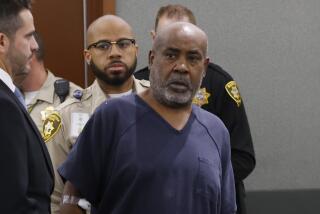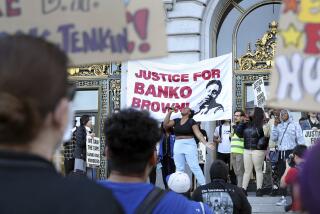Ex-Black Panther Is Deliberate Killer, Jury Told
- Share via
A prosecutor in opening arguments charged Tuesday that Jamil Abdullah Al-Amin, who was known in the turbulent 1960s as H. Rap Brown, deliberately stood over a sheriff’s deputy he had just shot and fired three more bullets into the dying man’s body.
The bullets, prosecutor Kellie Stevens told the jury in Atlanta at the start of Al-Amin’s murder trial, were fired into the deputy’s groin to show that the shooting was intentional.
Al-Amin, 58, who became a Muslim cleric after a past which included several arrests and a conviction for armed robbery for which he served time in New York state’s Attica Correctional Institution, is charged with killing Ricky Kinchen, a Fulton County deputy sheriff, and seriously wounding Aldranon English, his partner.
The two officers allegedly were trying to arrest Al-Amin on March 16, 2000, after a judge issued a bench warrant when Al-Amin failed to appear for a hearing on charges of theft and impersonating a police officer.
After the shooting, Al-Amin, who once served as minister of justice for the Black Panther Party, was captured near Montgomery, Ala., by police and federal agents who pursued him into the woods.
Later, he proclaimed his innocence, stating: “It’s a government conspiracy.”
The trial was initially postponed after the terrorist attacks on the World Trade Center and the Pentagon. Superior Court Judge Stephanie Manis, who ordered the delay, ruled that anti-Muslim sentiment could make it difficult to seat a jury.
The jury, which includes nine blacks, was selected from a pool of 1,500 people.
Stevens told the jurors that Al-Amin first opened fire with a .223 assault rifle when the deputies approached him. English returned fire and sought cover while Kinchen also began shooting as he tried to protect his partner.
She said that when Al-Amin’s rifle was empty, he retrieved a 9-millimeter pistol from his Mercedes-Benz and shot Kinchen, who already was wounded, three times in the groin.
English survived and identified Al-Amin from a photo lineup, the prosecutor added. He also identified the Mercedes-Benz, which contained bullet holes.
The assault rifle and the pistol were found in the woods, Stevens said. She told the jury that ballistic tests showed the weapons were used in the shootings.
In his opening statement, Jack Martin, a lawyer for Al-Amin, charged that English was coerced by other police officers to select Al-Amin.
The defense lawyer told the jury that other officers asked English if he knew Al-Amin--perhaps hinting that Al-Amin’s photograph would appear in a photo lineup book English was shown in the hospital.
English later selected Al-Amin’s photograph from the mug book.
Martin said that English, on the night of the shooting, reported that he had wounded his assailant who had gray eyes.
The defense lawyer said Al-Amin has brown eyes and was uninjured when he was seized four days later.
“The authorities made a mistake in this case,” Martin charged, “They assumed that Jamil Al-Amin must be guilty.”
Few activists in the 1960s were as controversial as Brown, who served as a leader of the Student Nonviolent Coordinating Committee and later joined the Black Panther Party. He urged blacks to arm themselves and declared: “Violence is as American as cherry pie.”
In 1970, the FBI put him on its most wanted list after he failed to appear to answer charges of inciting a riot after a speech he gave in Cambridge, Md. He was arrested in New York in 1972, convicted of the attempted robbery of a bar and was sentenced to five to 15 years in prison. Brown served four years before being paroled.
While in prison, Brown converted to Islam and changed his name to Al-Amin. Later, he opened a grocery store in Atlanta and established a mosque, where over almost a quarter of a century he developed the reputation as a charismatic figure, whose supporters have been raising funds for his defense.
English, who like his slain partner is African American, is expected to be a key prosecution witness who will testify about the attempted arrest of Al-Amin and the deadly shootout that ensued.
More to Read
Sign up for Essential California
The most important California stories and recommendations in your inbox every morning.
You may occasionally receive promotional content from the Los Angeles Times.













